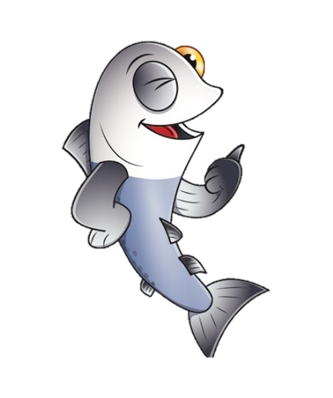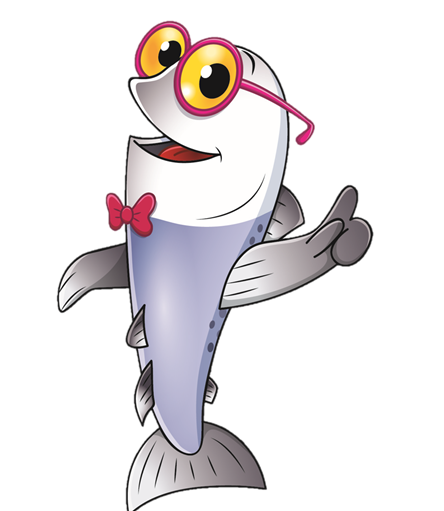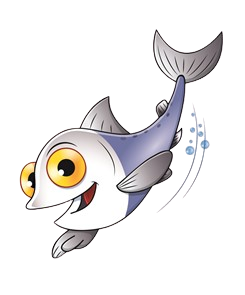Salmon's tale
The program
THE LIFE OF SALMO!
SALMON'S TALE EDUCATIONAL PROGRAM
The Salmon’s Tale educational program enables learning through research and discovery. It is designed to meet several curricular objectives for English reading comprehension, written expression and oral expression, as well as objectives in the mathematics, geography and natural sciences programs.
The program is focused on the rearing of young salmon from the fertilized egg stage to the stocking of fry in rivers. Incubators are installed in schools to host fertilized salmon eggs from the minister de l’Environnement, de la Lutte contre les changements climatiques, de la Faune et des Parcs (MELCCFP) Fish Hatchery in Tadoussac and the Société saumon de la rivière Romaine (SSRR) Hatchery in Havre-Saint-Pierre. Students are then able to witness the hatching of the eggs and the development of the fry until they are ready to be stocked in the river. 
This program helps raise students’ awareness of issues related to Atlantic salmon and its rivers, but also to the environment in general and the impact that we have on our surroundings. Students get to learn about the King of the River through English, math, biology, and ecology learning activities. The educational material is designed to integrate various concepts from different school subjects.
The student workbook, which can be purchased by schools or printed directly from the online document, includes multiple-choice or short answer questions, associative games, gap-filling texts, crossword puzzles, and a role-playing game based on environmental issues concerning the use and exploitation of salmon rivers.
THE ROLE OF THE FQSA
The role of the FQSA is to provide the delivery of salmon eggs and food to participating classes in the months of February-March and to provide remote technical support. We also ensure contact between various Salmon’s Tale partner organizations and schools when needed for additional support. In addition, we make the necessary arrangements with the minister de l’Environnement, de la Lutte contre les changements climatiques, de la Faune et des Parcs (MELCCFP) to ensure that all schools have the required permits to keep salmon in captivity and to be able to release them into the river at an authorized location.
The FQSA offers to do a short presentation on salmon and its life cycle to the classroom upon delivery of the eggs (upon request). We provide you with a teacher’s manual that serves not only to mark the exercises in the student workbook, but also to guide you throughout the program. We can also help you organize the stocking process in June.
THE SCHOOL'S ROLE AND RESPONSIBILITIES
- Schools must ensure that they are registered (registration form above) for the program by December 1st of each year for the February-March delivery. They must also fill out the order form and return it as soon as they register to ensure that they have the equipment on time.
- Schools can purchase the student workbook for $4,25 per copy or print it directly from the document available on our website (Educational resources). Schools are responsible for the purchase or rental of the incubation equipment.
- Acquiring the aquarium, the cooling unit and the filtration system will cost approximately $1 841,00 plus taxes. With this incubator, the class will be able to observe the development process from the egg stage to the growth of the fry over a period of nearly five months. The equipment can be reused year after year with proper storage and minimal maintenance. It should also be expected that some filtration components may need to be changed each year for 50 to 60$ a year (foams filters and charcoal).
- The person in charge of the program must assemble the incubator and ensure its maintenance, which is relatively simple to do. Refer to the “Educational Resources” section to see the various available support documents.

- At the end of the school year, the person in charge of the program is responsible for stocking the fry in a designated salmon river with his or her students. Several regional partners of Salmon’s Tale can help you with the stocking stage activity in the river.
FINANCIAL ASSISTANCE OPPORTUNITIES
The Fédération québécoise pour le saumon atlantique (FQSA) supports schools the best it can and tries to seek grants to help schools every year. For more information, please contact the person in charge.
Several organizations across Quebec are partners of the Salmon’s Tale program, and can help you with various services (animation, special stocking-related activities, etc.) or the rental of the incubator. These opportunities are limited, but do not hesitate to contact the person in charge of the program here at the FQSA.
Alexandra Kassatly
Salmon's tale program manager
Phone : (418)847-9191 or 1 (888) 847-9191, #112
Email : akassatly@fqsa.ca


